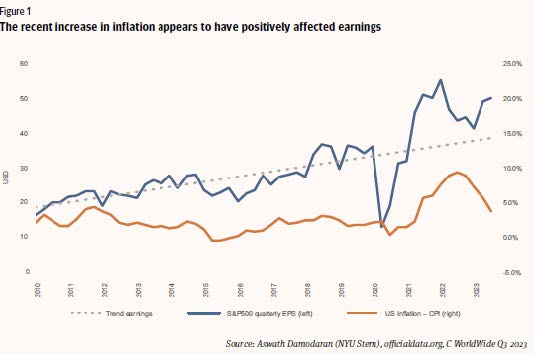C WorldWide Global Equity Outlook
November 20, 2023
According to Harbor’s subadvisor C WorldWide, short-term market moves are mainly driven by short-term investors. These moves seldom make sense to the firm, but the urgent human need for explanations on everything has created a short-term “explanation industry.” That said, C WorldWide is in a different business. They are looking at trends and themes of more lasting character. This is the perspective of this quarterly comment.
The Present Environment
Many market participants recognize and are influenced by the fact that you can invest in a U.S. 10-year government bond and get a nominal pre-tax return of approximately 4.5% or even above 5% in a short-term instrument. This, combined with signals from the U.S. Federal Reserve Bank that rates are being kept higher for longer, increases the likelihood of temporary downward pressure on equities, in our view. The delayed effects of extremely low interest rates are keeping U.S. economic activity higher for longer. The Fed is reluctant to signal lower rates too soon and will wait for a weaker economy before turning.
“Equity markets seem to be in a vacuum, where shorter-term investors feel uncomfortable, disregarding the potential turn and the advantage of companies with pricing power in handling inflation pressures.”

Therefore, equity markets seem to be in a vacuum, where short-term investors feel uncomfortable, disregarding the potential turn and the advantages of companies with pricing power in handling inflation pressures. At the end of the day, we think the key is real and not nominal returns – real, not nominal, purchasing power. We analyzed the long-term links between equities and inflation and concluded that equities, in most cases including the current cycle, have provided shelter against higher inflation. We expect that the present worries of higher inflation for longer will fade, and more accommodative monetary policies will improve the outlook for stocks.
The Bigger Picture
As long-term investors, we spend little time on headline news. The bigger the font, the less relevance. Even if the truth is not found in reading the headlines, we believe we live in a period where you must exploit what is behind some of the current big headlines. Although reading the latest news about different wars and conflicts around the world is distressing, it is important to understand the bigger geopolitical shift happening right now. The discovery and acceleration of generative artificial intelligence (AI) has significant implications, in our view. In addition, the fear created by media reports on the warmest summer in the history of our planet also has important repercussions. These issues can be hard to put into a spreadsheet, but they still matter for stock investors, in our view. In this short note, we share observations about why and what to do about it from our perspective.
Geopolitics
After the fall of the Berlin Wall and up until very recently, the world could be described as unipolar with only one superpower. We believe the world is transitioning to a multi-polar structure where China, Russia, and possibly India have ambitions about playing a bigger role – challenging the existing superpower. This is likely to be a permanent situation with political change, and with real economic impact, in our view. How do we best navigate in such an environment as a stock investor?

- Understand the thematic shift and the winners of reshoring driven by this geopolitical shift.
- Identify companies that are well positioned to this shift that sell services and products necessary nearly regardless of the scenario. Companies with strong pricing power often fit into this.
- Be more specific in your choice of stock exposure than ever before.
Generative AI
AI has been around for a long time as a productivity tool. An example is Google Search, which is a narrow form of AI. We are taking one step closer to Artificial General Intelligence, where a machine becomes as close as possible to being able to sense, think, and act like a human with Generative AI. Generative AI can interact in ordinary language form and create new written, visual, or auditory content by combining existing data. This is significant, and we will experience a significant proliferation of AI usage, in our view. How can we navigate this as a stock picker?
- It will be even harder to find short-term arbitrage opportunities in the market as an investor. Such a powerful tool is likely to be used in line with human biases, for example, behaving with short-term optimization in mind. This could, on the other hand, increase the opportunities.
- Understand which companies can monetize generative AI by offering generative AI products as a service that you want to pay for. Or companies that possess unique data assets in a world where fake information grows and populates our digital world faster than the growth of real information. Remember to listen to the experts.
- Understand how you personally can get involved to better understand and appreciate the use and applications of these tools.
Climate Change
The transition to a CO2-neutral energy system to achieve “net zero” requires massive investments in areas such as wind, solar, nuclear power, energy efficiency, and natural carbon sinks like forests as well as biochar. However, decarbonizing our global economy is not without challenges and dilemmas. What are the key investment implications of this?

- Understand the opportunities and risks of investing in companies that are dependent on subsidies linked to the transition to the next generations of energy systems more friendly to the climate. Other stakeholders (public/government interests) need to be considered. Thematic tailwinds create higher top-line growth, but what about the bottom line? You can’t pay dividends with revenues.
- New energy systems are typically highly capital intensive. Higher financing rates make these projects more expensive and potentially unrealizable without higher government subsidies. This questions the net zero ambitions and illustrates the obstacles of a high interest rate regime.
- Technological change and human ingenuity will need to play a significant role going forward. Be cognizant of your risk profile when participating as an investor in the next new thing.
- Theory is a simple story about how the world works. Be critical and do the research when it comes to climate change theorems. The devil is often found in the detail, and what sounds simple with obvious consequences might not be so obvious and investable.
”Equities have historically acted as a hedge against inflation, providing positive real returns during periods of rising inflation.”
Don’t Let Short-Term Uncertainty Disturb the Importance of Long-Term Thinking
Shorter-term equity markets are challenged by the valuation impact of continued high interest rates providing fixed-income investments as a positive yield alternative. Also challenging is the uncertainty of the magnitude of a likely economic slow-down and the consequences for corporate earnings. However, equities have historically acted as a hedge against inflation, providing positive real returns during periods of rising inflation. This has also been the case during this inflation cycle starting in 2021. However, we advocate spending time understanding three of the most important current trends: Geopolitics, Generative AI, and climate change to identify sustainable long-term investments and potential investment pitfalls.
Important Information
The views expressed herein are those of C WorldWide at the time the comments were made. These views are subject to change at any time based upon market or other conditions, and the author/s disclaims any responsibility to update such views. These views may not be relied upon as investment advice and, because investment decisions are based on many factors, may not be relied upon as an indication of trading intent. The discussion herein is general in nature and is provided for informational purposes only. There is no guarantee as to its accuracy or completeness.
Performance data shown represents past performance and is no guarantee of future results.
Investing entails risks and there can be no assurance that any investment will achieve profits or avoid incurring losses. Stock markets are volatile and equity values can decline significantly in response to adverse issuer, political, regulatory, market and economic conditions.
Indices listed are unmanaged, and unless otherwise noted, do not reflect fees and expenses and are not available for direct investment.
Earnings per share (EPS) is the portion of a company’s profit allocated to each outstanding share.
Arbitrage is the simultaneous purchase and sale of the same or similar asset in different markets in order to profit from tiny differences in the asset’s listed price.
S&P 500 Index is an equity index made up of 500 of the largest companies traded on either the NYSE, Nasdaq, or CBOE.
3210241
